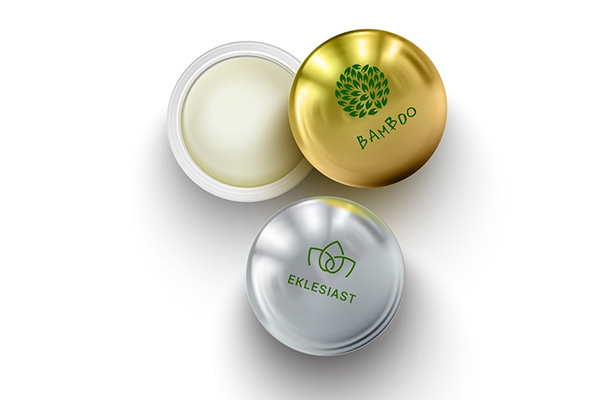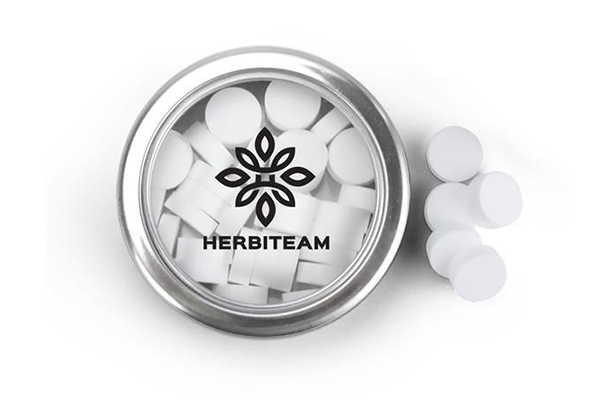October 16, 2019
CBD Trend Creates Buzz in Promo
The hemp-derived substance is popping up in all kinds of products, from lip balms to breath mints, and its popularity is only expected to grow.
Looking for the next buzzworthy promotional product? Consider tapping into the growing CBD (cannabidiol) market – which could surpass $20 billion in the U.S. by 2024, according to BDS Analytics, a cannabis-focused market research firm. Don’t worry: Though this chemical compound is derived from the cannabis plant, it won’t get your clients buzzed. Unlike its more notorious cousin THC, CBD doesn’t have the psychoactive properties that get users high.
“It’s like alcohol-free beer,” says Michael Beach, founder and CEO of Highline Promo (asi/60730), a Denver-based supplier that sells branded cannabis products as well as CBD capsules, creams and other items.
Many proponents of CBD have elevated it to near “miracle drug” status, claiming it can do everything from helping with stress, anxiety and depression to treating menstrual cramps and acne. Some athletes swear by CBD creams to aid in muscle recovery and reduce inflammation after workouts.
Ever since the 2018 Farm Bill legalized the cultivation of industrial hemp, CBD has been added to a slew of products, from lotions and creams, to bath bombs and lip balms, even pet treats. Kroger, Walgreens and convenience stores sell CBD products. Food and beverage companies like Ben & Jerry’s are poised to release CBD-enhanced flavors once the Food and Drug Administration (FDA) gives its blessing.
“CBD is growing so fast on the retail side,” says Dan Webb, president of Eagen, MN-based Webb Company (asi/95838), which offers CBD-infused mints, lip balms and other products. “We’re just skimming the surface of this still.”

CBD-infused lip balm is one of many products offered by Webb Company.
Webb Company launched its own CBD line at the ASI Show Chicago last year. “We always try to be on the cutting edge of product lines,” says Webb. But, “The education wasn’t there yet. We took a step back and waited for the education and know-how to catch up to us.”
By the time this year’s Chicago show rolled around, Webb says attendees were more knowledgeable and enthusiastic about CBD. Still, there are many misconceptions and gray areas surrounding the substance.
The FDA has approved one CBD-derived drug to treat a rare, severe form of epilepsy, but it’s still gathering data and determining how it will classify and eventually regulate CBD. Specifically, the FDA wants to know the effects CBD could have on the liver if ingested regularly over time, the effects of cumulative exposure when people use or ingest multiple CBD products in a day and whether it’s safe for pregnant women, the elderly, children and animals.
FDA is working to answer questions about the science, safety, and quality of products containing cannabis and cannabis-derived compounds, particularly CBD. https://t.co/7BC8qQVLs6 pic.twitter.com/UZPyakXrp8
— U.S. FDA (@US_FDA) June 14, 2019
In August, the Drug Enforcement Administration (DEA) clarified that CBD is not considered a controlled substance as long as it’s derived from hemp plants grown by licensed farmers and contains less than 0.3% THC.
“Some of the credit card processing companies still haven’t updated their policies and terms and still see CBD as a Class 1 drug,” Webb says, adding that their “antiquated policies” have caused some headaches for his company.
Though promotional products suppliers are able to list CBD products on ESP, Charles Machion, ASI’s senior counsel, crafted a disclaimer that appears with each listing. The notice warns potential buyers that CBD “may not be legal to sell” in their jurisdiction and suggests they consult state and federal law “to ensure your sale of the product is legal.”
Sellers of CBD also must be careful not to make any direct health claims about their products. “We typically say things like people have found common benefits, such as …” Webb says of his company’s marketing message regarding CBD products.
It’s important to note that because federal regulations of CBD are lagging, the quality of the substance can vary depending on the source. Last month, for example, CBS News partnered with Mile High Labs to test nine CBD oil samples and found that several contained lower doses than advertised and one was significantly higher, with 210% more CBD than listed on the label.
“People want to make sure they’re getting good quality products,” Webb says. “We try to do everything possible to give them confidence in what we’re doing.”
He notes that the Webb Company purchases CBD in its raw form and infuses it on site into its creams, mints and balms, then does third-party testing to make sure the products are “compliant, safe, consistent and what they say they are.”
Despite all the caveats, however, Webb and other suppliers see nothing but positive growth potential for CBD sales.

PMGOA offers CBD-infused mints, among other products.
“I think more and more professionals are opting to put their logo on CBD products, depending on their line of work,” says Nara Lakhani, sales manager with Sugar Land, TX-based PMGOA (asi/79982), which offers roll-on cream, liquid infusers and other CBD products. “The thought of getting a CBD product creates a certain response, it catches people’s attention. I think it’s more likely the person on the receiving end of the promotional item will keep it and remember the brand that handed it out.”
According to a January 2019 nationally representative survey by Consumer Reports, around 64 million Americans have tried some form of CBD in the last 24 months. The survey found that 40% of users are under 30, but many baby boomers are still willing to give it a whirl – around 15% of those who’ve tried CBD are over 60. One out of seven CBD users surveyed says they use the compound every day for various health and wellness-related reasons.
“These products can be used by a large demographic of individuals, ranging from young adults with acne to elderly with back pain,” Lakhani agrees.
For the promotional industry, the immediate opportunity is working directly with the CBD shops that have been opening up across the country, Beach says. “You’ll see they’re buying CBD products from a wide variety of suppliers, and each one puts their information on the logo,” he adds. “What we provide is a branded product that they can label with the name of their CBD shop on it. It brings continuity to the store and gives them a more professional look.”
Webb recommends targeting industries such as senior centers, yoga and wellness businesses, chiropractors, sports medicine and pet care brands. But, he notes, the list of potential markets will likely grow as CBD becomes more mainstream.
Indeed, Webb believes CBD could one day be as ubiquitous and accepted as aspirin or ibuprofen. “My grandmother, who’s 90, she’s your typical Catholic old lady from North Dakota who would never touch the dope,” Webb says. “We gave her CBD lotion after she had her second knee replaced, and within a month, she was more active than she’s been in the last 15 years.”